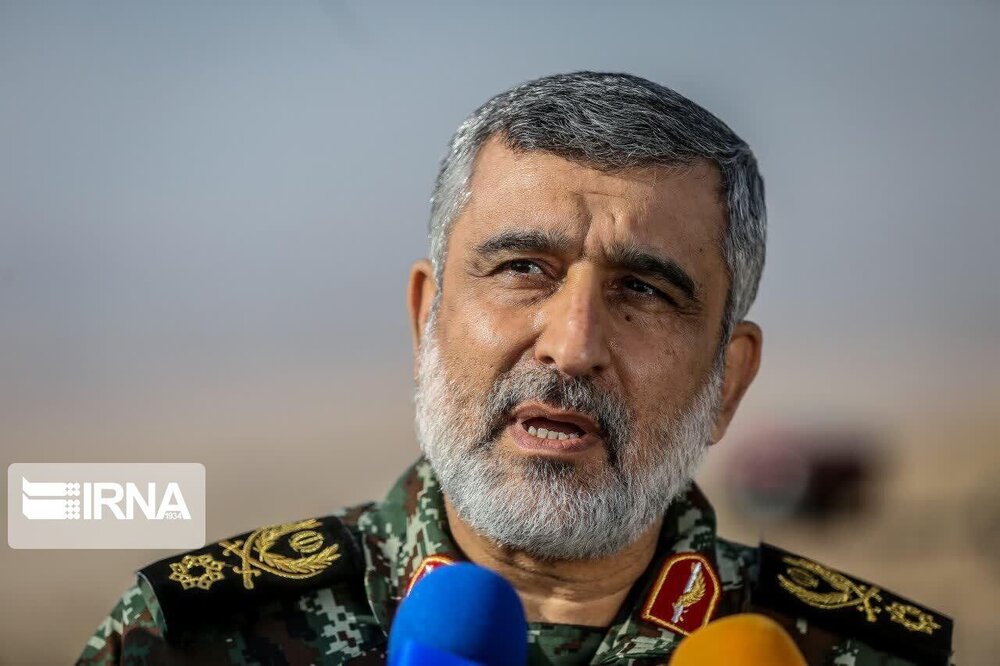Iran achievements will pop up on incident day: IRGC commander

TEHRAN- Brigadier General Amir Ali Hajizadeh, the commander of the IRGC Aerospace Force, said on Sunday that enemies will face Iran’s achievements on the day of the incident including devastation of foes at a distance of 1,500 kilometers, which of course is not accidental.
During a meeting with a group of esteemed religious scholars from the seminaries of Qom and Mashad, Brigadier-General Hajizadeh remarked that Iran's missile capability is superior to that of other countries.
A coterie of high-level seminary teachers from Qom and Mashhad paid a visit to the IRGC Aerospace Force's exhibition of achievements on Sunday.
Brigadier General Hajizadeh commented in remembrance of Martyr General Hassan Tehrani Moqaddam that “Iran is now a world pioneer in the field of drones and that its accomplishments have posed a challenge to the movements that the big and mighty militaries of the world had begun decades earlier.”
General Hajizadeh recounted days that they both spared no opportunity to serve the country, saying “due to lack of having appropriate weaponry during Iran-Iraq war we could not pose a threat to Baghdad.”
In the 1980s, Saddam Hussein’s army showered certain Iranian cities, including Tehran, with missiles that were provided by Western countries. France and the former Soviet Union were the main suppliers of weapons to the Saddam regime.
Companies from Germany, the Netherlands and other Western countries also provided materials for building chemical weapons by Saddam Hussein’s regime. However, on those days Western countries even refused to sell barbed wire to Iran.
‘Significant generational leap’
General Hajizadeh went on to say that the news of the advanced hypersonic ballistic missile, which was announced at the martyrdom anniversary of General Tehrani Moqaddam, has a high speed and can maneuver both in space and out of it, but today it has been released in the media and it is a significant generational leap in the missile-producing sector that for decades the enemy cannot be able to match.
The IRGC Aerospace Force commander said Iran is now among the top countries having the high-end capabilities of creating missiles and drones. “We are at the world level in the field of unmanned aircraft and UAVs, and have challenged the trend that so-called superpowers have already instigated for decades.”
He underscored that from the imposed war on, all attempts have been made to make Iran a superpower in the fields of missiles and drones, adding that “those so-called superpowers, once Iran was seeking their assistance, are now in pressing need of Iran.”
“Recently, with God’s help, we are capable of launching the Qaem-100 satellite-carrying rocket, which is a three-stage solid fuel suborbital carrier, into space which will be put into orbit this year,” he explained.
Qaem-100, the first of its kind manufactured by Iranian scientists, is capable of putting satellites weighing up to 80 kilograms into orbit 500 kilometers from the earth's surface.
Iran's Minister of Information and Communications Technology, Issa Zarepour, said that Nahid satellite will soon be sent into orbit.
Based on his remarks, preparations are being made to launch the satellite in the end of the current Iranian year, which concludes on March 2023.
The Iranian Khayyam satellite is operating, its photographs are being received, and there is connection with the instruments that need its images, he continued.
According to him, the Khayyam satellite image reception center is the Iran Space Agency's first, largest, and best-equipped facility for managing and receiving Iranian satellite photos.
Iran's minister of Information and Communications Technology noted that "joint missions have been specified" and that "cooperation and engagement with Russia in the space area continues."
The Khayyam satellite was launched on August 9, 2022, by a Soyuz rocket from Kazakhstan's Baikonur space station.
Iran has made consistent and forward-thinking progress over the past four decades toward developing space technology.
Through various sanctions, the adversaries have attempted to halt advancements in economics and science, especially in Iran's space sector.
Nevertheless, the nation has developed a wide range of space and space-related technology, which should be viewed as a major triumph for Iran despite all the constraints and challenges.
Leave a Comment